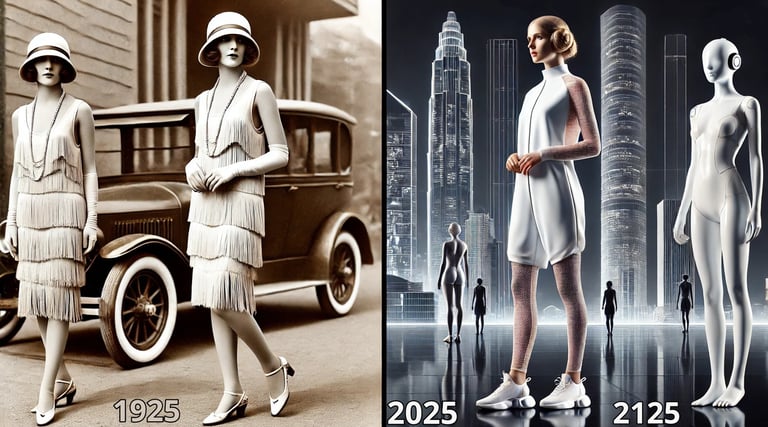The Term "Feminist" Belongs in Quotations
We had a good thing going and for some reason or another the actions of a few fools ruined it for the entire bunch. There's eons of history where wrongs were committed against women by men but to take away all the perks?! It's a bit much, no? Now we're all supposed to be on this feminist train, but I want off of this ride because independence is a tiresome thing!
Illya Burke
2/27/20254 min read


The Evolution of Women's Rights: Progress in Healthcare, but What About Society?
Over the past century, women have experienced profound changes in their lives. Advancements in healthcare, education, and political rights have certainly shaped the landscape of opportunities available to women today. The ability to vote, own property, enter the workforce, and access modern healthcare are just a few of the remarkable strides women have made. However, as we reflect on these changes, it’s also important to consider the broader implications of societal shifts that may not be as widely discussed. While we celebrate how far we’ve come, we must also examine how some aspects of modern life, including changes in culture and values, may not necessarily have resulted in the improvement we anticipated.
Healthcare Advancements: A Bright Spot for Women
Without a doubt, healthcare for women has improved dramatically over the past 100 years. In 1925, women faced medical challenges and limitations that seem almost unfathomable today. Life expectancy was lower, maternal mortality rates were high, and many diseases, especially those related to reproduction, were poorly understood or poorly treated. In the early 20th century, women’s health concerns were often dismissed or misdiagnosed, and they had little access to the advanced medical care that is now available.
Today, women have access to groundbreaking treatments for cancer, improved prenatal and postnatal care, and advancements in reproductive health, including birth control and fertility treatments. The once terrifying prospect of childbirth is now far safer for most women, and healthcare access is a right for many women who were previously underserved. These advancements have undeniably led to longer, healthier lives for women across the globe.
But, as we see healthcare improve, there is a different story unfolding in other parts of society. From fashion to entertainment, and even in our everyday interactions, we’re witnessing a significant shift in the way women are portrayed and expected to behave. The values that many once held dear—chastity, manners, modesty, intellect, and class—seem to have faded into the background.
There was a time when society placed great importance on maintaining a sense of propriety. Women were taught to carry themselves with dignity, to respect their bodies, and to value their intellect. There was a sense of decorum that permeated public life, and many women took pride in the role that society expected them to play—one that was centered on grace, intellect, and substance.
Fast forward to today, and we see a society that is often more fixated on physical alterations, vulgarity, and over-exposure, particularly through social media. Clothing styles have evolved, yea, but in ways that many feel are less about self-expression and more about conformity to trends that emphasize cheap morales and sexuality over character or intellect.
Music, movies, and other forms of entertainment are glorifying shallow, superficial qualities, and we see fewer examples of women who represent both beauty and depth. The shift is evident in the rising trend of objectifying women in the media, while simultaneously pushing ideals that are not aligned with the values many once held as central to womanhood. This is totally a direct result from the women's movement and the rights bestowed upon the fairer sex since then. Decent parenting is now looked upon as extremism and disciplinary action has been demonized.
The Role of Feminism and Legal Rights
In the last 50 years, feminism and the expansion of women’s rights have resulted in many achievements, from the right to vote to the right to work without discrimination. Supreme Court rulings, such as those upholding abortion rights and protections against gender discrimination, have unquestionably expanded women’s freedoms. Yet, there is a growing argument that some of these legal advancements have led to unintended consequences. As women gained greater control over their own bodies and careers, the lines between empowerment and exploitation became blurred.
Some would argue that while these rights allowed for individual freedoms, they also spawned an environment where certain societal expectations were inadvertently removed—leaving women without guidance for how to navigate these new freedoms. There are those who believe that, in the rush to provide women with all options, we may have overlooked the importance of moral and ethical foundations. When we no longer expect women to embody ideals such as modesty, class, or scruples. Is there a price to pay? Hell yea, look around. They created monsters!
A Call for Reflection
While there is no denying the immense progress women have made in the last 100 years, it is also important to consider that some of these changes have come at the cost of societal cohesion and individual correctness. Again, we've traded moral integrity and intellectual pursuit for shallow ideals that leave us questioning our worth. And as women, how can we reclaim and redefine a new set of values that balance empowerment with personal responsibility?
During the 1920s, women embodied a refined poise and intellect that balanced newfound freedoms with grace and self-respect. The era’s flapper movement, while rebellious, still carried an air of sophistication—women challenged societal norms with elegance, engaging in literature, arts, and political discourse while maintaining a sense of dignity and self-restraint. Their fashion, though daring for the time, exuded class, and their conversations reflected a deeper engagement with culture, philosophy, and societal progress. Women of the 1920s were pioneers in their own right, striving for equality without forsaking the very essence of decorum that defined them as ladies. They commanded respect not through shock value, but through wit, intelligence, and a controlled confidence that left lasting impressions.
Contrast this with today, where demoralized values and a decline in self-respecting etiquette have redefined modern womanhood. Social media and hyper-sexualized trends have replaced dignity with validation-seeking behaviors, emphasizing appearance over intellect and instant gratification over long-term fulfillment. Many women today prioritize external validation over self-worth, shedding the refinement that once characterized feminine strength. At this rate, by 2125, women may be entirely reprogrammed—reliant on artificial standards, disconnected from the depth of their own history, and devoid of the very essence that once made them the pillars of grace and wisdom. The erosion of self-respect and the rejection of etiquette in favor of superficial trends suggest a future where the essence of womanhood is entirely rewritten, leaving behind an empty shell of what once was.
The conversation should not simply be about whether women have more rights today, but also about what those rights should mean for the collective well-being of women—and for society as a whole. It’s not about turning back the clock to a time when values seemed more aligned, but about making space for a more balanced approach. One where women can embrace both progress and traditional values in ways that serve them.
